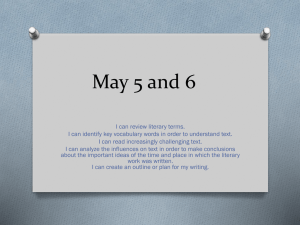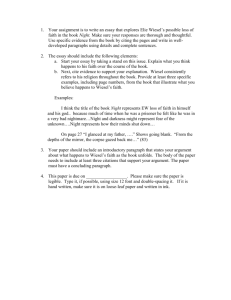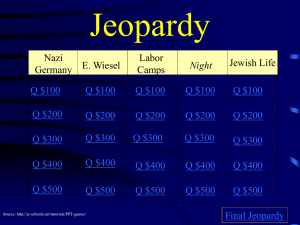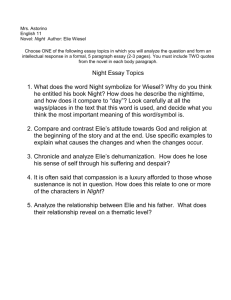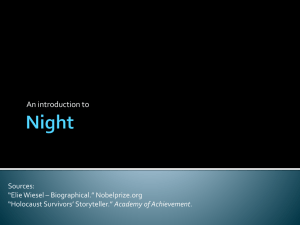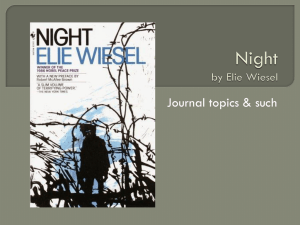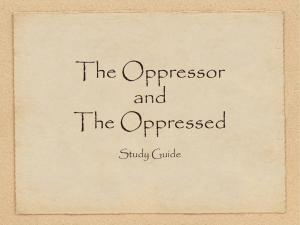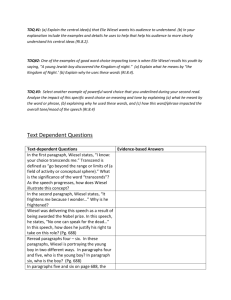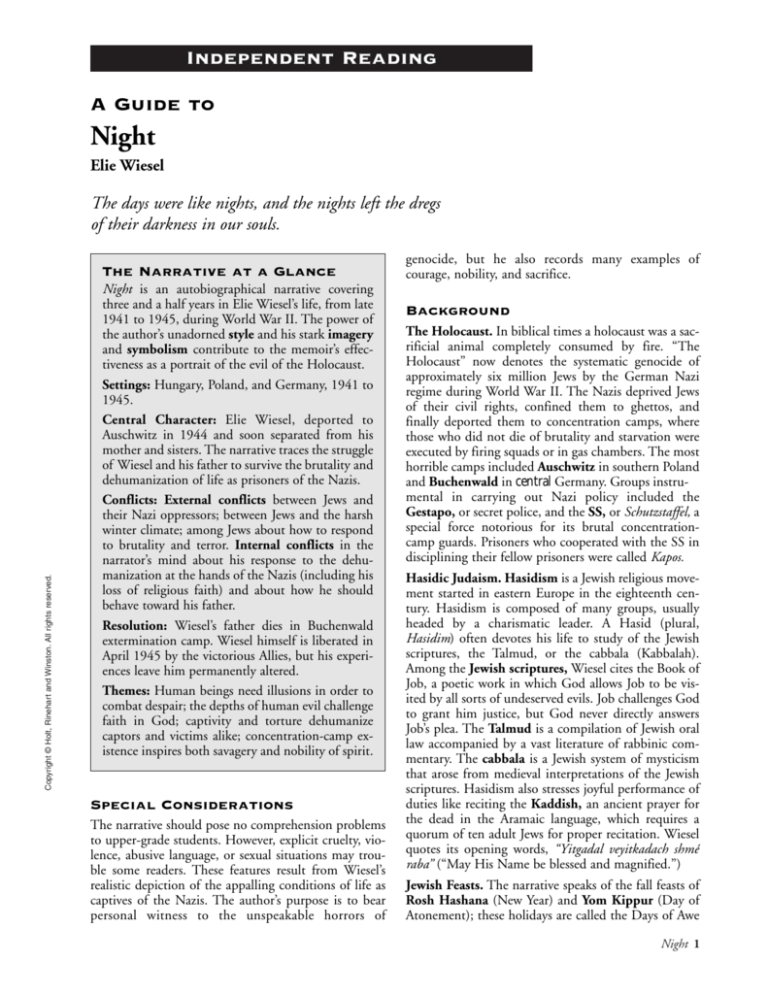
Independent Reading
A Guide to
Night
Elie Wiesel
The days were like nights, and the nights left the dregs
of their darkness in our souls.
Copyright © Holt, Rinehart and Winston. All rights reserved.
The Narrative at a Glance
Night is an autobiographical narrative covering
three and a half years in Elie Wiesel’s life, from late
1941 to 1945, during World War II. The power of
the author’s unadorned style and his stark imagery
and symbolism contribute to the memoir’s effectiveness as a portrait of the evil of the Holocaust.
Settings: Hungary, Poland, and Germany, 1941 to
1945.
Central Character: Elie Wiesel, deported to
Auschwitz in 1944 and soon separated from his
mother and sisters. The narrative traces the struggle
of Wiesel and his father to survive the brutality and
dehumanization of life as prisoners of the Nazis.
Conflicts: External conflicts between Jews and
their Nazi oppressors; between Jews and the harsh
winter climate; among Jews about how to respond
to brutality and terror. Internal conflicts in the
narrator’s mind about his response to the dehumanization at the hands of the Nazis (including his
loss of religious faith) and about how he should
behave toward his father.
Resolution: Wiesel’s father dies in Buchenwald
extermination camp. Wiesel himself is liberated in
April 1945 by the victorious Allies, but his experiences leave him permanently altered.
Themes: Human beings need illusions in order to
combat despair; the depths of human evil challenge
faith in God; captivity and torture dehumanize
captors and victims alike; concentration-camp existence inspires both savagery and nobility of spirit.
Special Considerations
The narrative should pose no comprehension problems
to upper-grade students. However, explicit cruelty, violence, abusive language, or sexual situations may trouble some readers. These features result from Wiesel’s
realistic depiction of the appalling conditions of life as
captives of the Nazis. The author’s purpose is to bear
personal witness to the unspeakable horrors of
genocide, but he also records many examples of
courage, nobility, and sacrifice.
Background
The Holocaust. In biblical times a holocaust was a sacrificial animal completely consumed by fire. “The
Holocaust” now denotes the systematic genocide of
approximately six million Jews by the German Nazi
regime during World War II. The Nazis deprived Jews
of their civil rights, confined them to ghettos, and
finally deported them to concentration camps, where
those who did not die of brutality and starvation were
executed by firing squads or in gas chambers. The most
horrible camps included Auschwitz in southern Poland
and Buchenwald in central Germany. Groups instrumental in carrying out Nazi policy included the
Gestapo, or secret police, and the SS, or Schutzstaffel, a
special force notorious for its brutal concentrationcamp guards. Prisoners who cooperated with the SS in
disciplining their fellow prisoners were called Kapos.
Hasidic Judaism. Hasidism is a Jewish religious movement started in eastern Europe in the eighteenth century. Hasidism is composed of many groups, usually
headed by a charismatic leader. A Hasid (plural,
Hasidim) often devotes his life to study of the Jewish
scriptures, the Talmud, or the cabbala (Kabbalah).
Among the Jewish scriptures, Wiesel cites the Book of
Job, a poetic work in which God allows Job to be visited by all sorts of undeserved evils. Job challenges God
to grant him justice, but God never directly answers
Job’s plea. The Talmud is a compilation of Jewish oral
law accompanied by a vast literature of rabbinic commentary. The cabbala is a Jewish system of mysticism
that arose from medieval interpretations of the Jewish
scriptures. Hasidism also stresses joyful performance of
duties like reciting the Kaddish, an ancient prayer for
the dead in the Aramaic language, which requires a
quorum of ten adult Jews for proper recitation. Wiesel
quotes its opening words, “Yitgadal veyitkadach shmé
raba” (“May His Name be blessed and magnified.”)
Jewish Feasts. The narrative speaks of the fall feasts of
Rosh Hashana (New Year) and Yom Kippur (Day of
Atonement); these holidays are called the Days of Awe
Night 1
Main Individuals
(in order of appearance)
Eliezer (Elie) Wiesel, the narrator, twelve when the
book opens in 1941; deported in the spring of 1944 to
Auschwitz, where he and his father are separated from
his mother and sisters. Elie had been drawn to Jewish
mysticism, but the horrors of life under the Nazis
weaken his faith.
Moshe the Beadle, a poor “man of all work” in the
Hasidic synagogue of Sighet; Wiesel’s instructor in
Jewish mystical lore; survivor of an early deportation
whose story is not believed.
Chlomo Wiesel, Wiesel’s father, a shopkeeper of Sighet
who suffers through nearly a year of nightmarish captivity in Nazi concentration camps before dying in
Buchenwald in January 1945.
Mrs. Wiesel, Hilda, Béa, and Tzipora, Wiesel’s
mother, two older sisters, and baby sister. Elie does
not learn until after the war that only Hilda and Béa
survived.
Stein of Antwerp, a distant relative of the Wiesels,
whom Wiesel and his father encounter at Auschwitz.
Akiba Drumer, a camp inmate; a mystic who believes
that God must be testing the Jews through the
Holocaust; he loses his faith just before he is killed.
Juliek, Polish violinist whom Wiesel meets at Buna; he
dies during the forced evacuation to Buchenwald.
Yossi and Tibi, young Czech brothers who become
Wiesel’s friends at Buna.
Rabbi Eliahou, a well-loved prisoner whose son abandons him during a forced march in winter.
Contents
The narrative is divided into nine untitled and unnumbered sections.
First Section. The opening section of Night provides
exposition, and sketches the principal external conflict of the work, which is told from the first-person
point of view. In the town of Sighet in Transylvania
(then in Hungary, now in Romania), twelve-year-old
Eliezer Wiesel, a shopkeeper’s son, is drawn to study the
cabbala with Moshe the Beadle. One day, however,
Moshe and all other foreign Jews are expelled from
Sighet. Several months later Moshe returns with a tale
of horror: The deportees were forced to dig their own
common grave, then shot in a mass execution. He
2 Night
escaped with a leg wound by playing dead. While there
is still time to leave and perhaps escape the Nazis, the
Jews of Sighet choose not to believe his story.
Over the next three years various reports foreshadow the catastrophe to come. But the people cherish the illusion that normal life will continue.
Everything changes in the spring of 1944, when the
German army arrives in Sighet and begins to curtail the
civil rights of Jews. Leaders are arrested, valuables are
confiscated, and all Jews are forced to wear a yellow star
and live in one of two ghettos. One night Wiesel’s
father returns from a special meeting of the Jewish
Council with the shocking news that all Jews are to be
deported to an unknown destination. The process takes
several days. Finally, as two Gestapo officers watch with
smug satisfaction, Wiesel’s family joins the last Jews to
leave Sighet, packed eighty to a car in a railroad train.
Second Section. The section describes the train journey and arrival at Auschwitz. With grim irony, Wiesel
contrasts the blossoming spring landscape outside the
train with conditions inside. After two days the prisoners are tortured by hunger, thirst, and mental anguish.
Madame Schächter, a woman separated from her husband and two older sons, begins to experience nightmarish visions. She cries out warnings about the huge
flames of a fiery furnace. Her screams so unnerve her
fellow prisoners that they gag her and beat her. The
episode foreshadows the cremation furnaces to come
and begins to develop the theme of the captives’ dehumanization. When the train arrives at Auschwitz, the
prisoners at first cling to the illusion that prison life will
be tolerable. However, that very night they see flames
gushing out of a tall chimney and smell burning flesh.
They realize that Auschwitz is an extermination center.
Third Section. Men and women are separated, and
Wiesel catches a glimpse of his mother and sisters disappearing into the crowd. He is never to see his mother
or youngest sister again. Over the next three weeks,
Wiesel and his father discover the cruel realities of life
as prisoners of the Nazis. They try to remain together
and to survive. Acting on a tip from a fellow prisoner,
Elie lies about his age, and both he and his father survive their first “selection” by Dr. Mengele—a process in
which weak or sick persons are condemned for slaughter. As they pass ditches where babies are burning, the
father’s voice chokes as he asserts that “humanity” is not
concerned with the Jews. Revolt against God rises
within Wiesel when his father and others begin to recite
the Kaddish, the Jewish prayer for the dead. He wonders, How can God permit such barbarity?
Dehumanizing conditions mark barracks life. The
prisoners’ heads and bodies are completely shaved; they
are disinfected with petrol and issued ill-fitting uniforms; they are beaten by the Kapos on the slightest
pretext. An SS officer warns them that if they do not
work, they will be sent to the crematory. When another
prisoner deals Wiesel’s father such a violent blow that
Copyright © Holt, Rinehart and Winston. All rights reserved.
or the High Holy Days. The feasts encourage reassessment of one’s life and deeds, and Jewish tradition
teaches that on these days God decides who will live
and die during the coming year. In ordinary life the
Days of Awe promote spiritual renewal and reconciliation with others. In the concentration camp they ironically reinforce Elie Wiesel’s loss of faith.
Copyright © Holt, Rinehart and Winston. All rights reserved.
he falls to the ground, the son suffers a wrenching
internal conflict. Only yesterday he would have
defended his father against such an attack; now he passively focuses on his own survival.
The prisoners’ morale improves somewhat after a
young Polish Kapo urges them not to lose faith or
courage. The captives’ left arms, however, are then tattooed with numbers that replace their names. The
numbers are emblems of their dehumanization. In
another episode, Stein, a distant relative of the Wiesels’
from Antwerp, Belgium, seeks news of his wife and
children. Pitying him, Elie lies: He says his mother has
heard that Stein’s family is all right. This theme of
deception and illusion as a defense against despair
emerges again toward the end of the section. Akiba
Drumer, a Hasid, expounds the theory that a loving
God is merely testing His people. Wiesel and his father
reassure each other that Elie’s mother and sisters are
alive in a labor camp. After three weeks in Auschwitz,
father and son are sent to a new camp, Buna.
Fourth Section. A fellow inmate at Buna tries to extort
Wiesel’s shoes in exchange for a favorable work assignment. Elie resists, but later his shoes are confiscated
anyway. His new comrades include a group of Jewish
musicians who are not allowed to play German music.
Juliek, a Polish violinist, explains that Idek the Kapo suffers from a streak of madness and that it is best to keep
out of his way. Wiesel and his father are sent to work in
a warehouse for electrical equipment. Elie becomes
friends with Yossi and Tibi, Czech brothers whose parents have been killed. The three talk of Palestine.
Various incidents interrupt the monotony of camp
life. Elie manages to save his gold crown from a malicious dentist who sells gold on the black market. A
French girl who works next to him at the warehouse
consoles him after Idek beats him with his fists. (In a
flash-forward, Wiesel recalls meeting her many years
later in the Paris Metro.) In a frenzy, Idek beats Wiesel’s
father with an iron bar, calling him a lazy old devil.
Wiesel again upbraids himself for failing to rise to his
father’s defense. Franek the foreman soon succeeds in
extorting Wiesel’s gold crown from him.
When the Allies bomb the area, the inmates do not
fear the bombs. Instead, their hopes are raised for liberation, even for revenge. A young Polish prisoner is
hanged a week later for stealing during the air raid. The
whole camp is marched past the hanged man. Another
public hanging, that of a young boy, is botched, and he
struggles for more than half an hour. Forced to witness
this horror, one inmate asks, “Where is God now?”
Wiesel feels that God Himself hangs on the gallows.
Fifth Section. Summer 1944 fades, and the Jewish
New Year, Rosh Hashana, arrives. The theme of
destruction of faith continues to be developed as Wiesel
wonders how he can bless the name of God. On Yom
Kippur, the Jewish Day of Atonement, Elie feels there
is no reason to observe the traditions of the holy day.
The author effectively employs suspense as he tells
how he and his comrades struggle to survive the next
selection. Both Wiesel and his father pass, but the
father is then ordered to remain in camp on the day of
execution. In a frantic farewell the father gives his son a
knife and a spoon, and Elie reflects on how pathetic this
“inheritance” is. At the end of the day, Wiesel discovers
that his father has won a reprieve by proving he can still
work. Akiba Drumer was not so lucky. The erstwhile
mystic lost his faith and thereby his ability to resist the
Nazi executioner.
During the winter, as the prisoners struggle to survive the cold, Wiesel’s right foot begins to swell. He is
taken to the camp hospital, and his sole is surgically
opened to drain the pus. Being hospitalized terrifies
him; he fears he will fail the next selection. A new problem arises when Russian troops press westward into
Poland. Despite his unhealed foot, Elie joins his father
and other inmates being evacuated to Germany by the
retreating Nazis. They march out of camp during a
heavy snowstorm. (He and his father could have stayed
behind in the camp hospital but feared the Germans
would blow it up. After the war, Wiesel learned that the
undamaged hospital had been liberated by the Russians
two days after the evacuation.)
Sixth Section. The author describes the ghastly march
from Buna to Gleiwitz. The weak fall and die in the
wayside snowdrifts; some prisoners are trampled to
death. Wiesel feels the fascinating attraction of death as
a relief from physical agony and exhaustion. When the
kindly Rabbi Eliahou asks for news of his son, Elie
recalls with a shudder that he saw the son deliberately
running ahead during the day’s march, hoping to be rid
of the ailing rabbi, “an encumbrance which could lessen
his own chances of survival.” He prays for the strength
never to abandon his own father.
On arrival at Gleiwitz the prisoners are crammed
into a barracks so crowded they must struggle for air.
Wiesel recognizes the voice of Juliek, the violinist he
met at Buna. In the darkness, Wiesel believes he hears
Juliek sweetly play a fragment of a Beethoven violin
concerto for this audience of the dead and dying. In the
morning, Juliek is dead and his violin lies nearby,
crushed. After three days without food or drink, the
Wiesels narrowly survive yet another selection. Then
they are loaded onto a train for Buchenwald.
Seventh Section. Wiesel describes another grim journey. For ten days the prisoners are given no food.
Corpses are thrown into fields alongside the railroad
tracks. The inmates’ hunger reduces them to beasts; a
son strangles his own father for a morsel of bread. Wails
of despair rend the air. When the train arrives at
Buchenwald, only twelve out of the original one hundred prisoners in Wiesel’s car are able to leave alive. The
fortunate few include Wiesel and his father.
Eighth Section. In this climactic section, Chlomo
Wiesel dies less than three months before the Allies
Night 3
Ninth Section. Buchenwald is liberated by the Allies in
April 1945. The inmates are ravenous with hunger.
Ironically, three days after he is freed, Elie suffers a
serious case of food poisoning. After two weeks in a hospital, hovering between life and death, he looks into a
mirror for the first time since deportation from Sighet.
The final sentences of Night create a powerful image:
From the depths of the mirror, a corpse gazed
back at me.
The look in his eyes, as they stared into mine,
has never left me.
Approaches for
Post-Reading Activities
Discussion groups or individual students might focus
on the following activities.
1. Researching the Life of Elie Wiesel
Night ends in 1945, but Wiesel led a productive and
highly interesting life in the decades that followed.
Students might read a short biography of Wiesel (in
Contemporary Authors, for instance) or look at some
of his other writing (notably Dawn and The Accident,
the two other volumes of The Night Trilogy). Then
have them consider
• how Wiesel’s experiences as a captive of the Nazis
have affected his later personal and public life
• in what ways he has tried to foster world peace and
prevent a recurrence of Nazilike brutality
2. Investigating Literature of the Holocaust
Students might select and report on other works that
deal with the Holocaust, such as Art Spiegelman’s
two-part graphic novel Maus, composed with grim
irony; Hannah Arendt’s Eichmann in Jerusalem: A
Report on the Banality of Evil; Anne Frank’s Diary of
a Young Girl; or the poems of Nelly Sachs, a winner
of the Nobel Prize in literature.
3. Analyzing German History After 1945
After World War II, both the victorious Allies and
the Germans themselves sought to lay the ground-
Copyright © by Holt, Rinehart and Winston, Inc.
All rights reserved. No part of this publication may be reproduced
or transmitted in any form or by any means, electronic
or mechanical, including photocopy, recording, or any information
storage and retrieval system.
Printed in the United States of America
4 Night
work for preventing a Nazilike racist regime from
establishing itself again in Germany. Students might
do research on the following and report to small discussion groups or the entire class:
• The Nürnberg (or Nuremberg) Trials of 1945–1946,
in which Nazi leaders were tried as war criminals by
an international tribunal.
• The steps taken by the Federal Republic of
Germany to prevent a recurrence of Nazism.
Students could research the laws of postwar
Germany and the conduct of the German media.
• The role of Jews in postwar Germany. How many
live in the country? What is their relationship to
other Germans?
Meet the Writer
Elie Wiesel (1928– ) was born in Sighet, Romania,
and grew up in a community of Hasidic Jews. In 1944,
he and his family were deported to Auschwitz in
Poland. After World War II, Wiesel lived and worked as
a journalist in Paris and later settled in the United
States. Night, the stark record of his Holocaust experiences, first appeared in French in 1958. Wiesel’s efforts
to keep the memory of the Holocaust alive in order to
help prevent such atrocities in the future earned him
the Nobel Peace Prize in 1986. Such efforts have permeated his career as a novelist, a journalist, and, for
many years, a professor at Boston University.
Read On
Joseph Conrad, Heart of Darkness. A classic exploration of the nature of evil, cast as an adventure narrative in nineteenth-century Africa.
Anne Frank, The Diary of a Young Girl. A Jewish
girl’s account of her family’s concealment from the
Nazis in Amsterdam, reissued in an expanded, definitive edition in 1995. It has been adapted for both stage
and screen as The Diary of Anne Frank.
Mark Helprin, “Tamar.” A poignant short story about
a young Jewish man in London on the eve of World
War II and the Holocaust.
Thomas Keneally, Schindler’s List. The true story of a
German businessman whose courage and resourcefulness saved many Jewish lives; adapted for the screen
in 1993.
Jeshajahu Weinberg and Rina Elieli, The Holocaust
Museum in Washington. The story of the museum’s
construction, with illustrations of exhibits.
Copyright © Holt, Rinehart and Winston. All rights reserved.
liberate Buchenwald. Wiesel’s internal conflicts intensify as he sees his father wracked by dysentery and
despair. Despite the guilt he feels over his own anger
toward his father, Elie stays near him almost to the end.
His death hastened by a blow to the head by an SS officer, the father—probably still alive—is taken away
while his son sleeps through the night. In the morning,
Wiesel remembers, “I did not weep, and it pained me
that I could not weep. But I had no more tears.”

